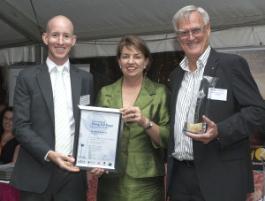CQUni's Mitch Duncan among 10 'tall poppies'
Published on 25 November, 2010
CQUniversity researcher Dr Mitch Duncan has been named among the 10 Queensland Young Tall Poppy Science Award Winners for 2010.
Mitch's research is centred on the effects of too little physical activity and too much sitting; the influence that community designs and workplace environments have on these behaviours; and how best to measure our behaviour in these environments. He's based at Rockhampton Campus.
LINK for details on the Tall Poppy Campaign
Dr Duncan, from our Institute for Health and Social Science Research, was among winners recognised and celebrated in front of 750 guests at the Premier's Science and Innovation Reception in Brisbane this week (Tuesday November 23). He accepted his award from Premier Anna Bligh and Chief Scientist Professor Peter Andrews.
Other winners came from Griffith Uni, Queensland Health, Mater Medical Research Institute, QUT, Qld Institute of Medical Research, UQ and the Institute of Health and Biomedical Innovation.
In another link to CQUniversity, our Deputy Vice-Chancellor (Research, Scholarship and Industry) Professor Jennelle Kyd is currently the Queensland Tall Poppy Ambassador (details via http://www.aips.net.au/228.html ) and has just been invited to be a Director on the Board of the Australian Institute of Policy and Science from 2011.
"The Young Tall Poppy Science Awards recognise early career researchers who have achieved significant scientific milestones and have demonstrated their willingness and ability to engage people in science," says Australian Institute of Policy and Science Executive Director, Elektra Spathopoulos. "They represent the drive and energy of Queensland researchers."
They will spend the next year engaging with teachers, school students, parents and the broader community around Queensland and across Australia as part of the Tall Poppy Campaign run by the Australian Institute of Policy and Science.
"The Awardees are keen to be role models for youth and to encourage them to think seriously about diversity and rewards that come with a career in science," Spathopoulos explains.
With Science issues and policy being debated more in the public sphere, and still decreasing enrolments in senior high school science, the need to inspire young people about science and engage and inform the wider community has never been more important.
"They will have opportunities to enlighten the community, industry and policy makers about the contribution that the sciences can make to crucial current issues in Queensland and beyond," adds Spathopoulos.


